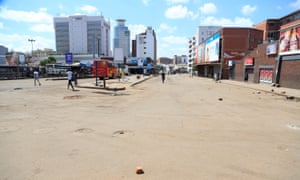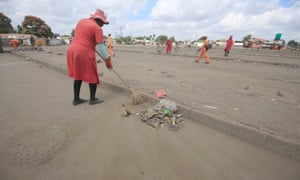Source: Coping with Coronavirus Zimbabwe style | The Zimbabwean

On an early morning emergency dash to collect supplies I was anxious about venturing out and what I would see. It was Day 5 of Zimbabwe’s 21-day Coronavirus lockdown and I knew that by now people who live hand to mouth and eke out living selling fruit and vegetables from roadside stalls would be getting desperate. Our taps were dry for the second day running and with gloves and a mask on I set out. People were out looking for water already, so far there was no news on where there were supplies of maize meal, the staple food.
I passed a man pushing a wheelbarrow with five empty yellow water containers, heading towards a public borehole. Fourteen people were already there ahead of him, standing in line at the borehole waiting for their turn to use the hand pump and fill their containers with water. This is coping with Coronavirus Zimbabwe-style.
Further along with a policewoman in uniform ignored me, she was busy taking a selfie photograph of herself on the side of the road, a block or two from the town centre. She wasn’t wearing a face mask. A group of four police men and women armed with truncheons were having an altercation with a man carrying a small cardboard box. None of the police were wearing face masks despite being a few inches away from the man. This is coping with Coronavirus Zimbabwe-style.
All week we’ve been seeing pictures of big crowds of people desperately trying to buy maize meal in Harare and Bulawayo. No chance for social distancing, no sign of masks, just a massive squash of people trying to get food for their families, people who have to choose between hunger and an invisible virus. Almost five hundred people have been arrested this week for being on the streets in breach of lockdown, crammed into police lorries and taken away but in the same week, 1680 prisoners have been released because prisons are overcrowded and congested. This is coping with Coronavirus Zimbabwe-style.
On Day 5 of Zimbabwe lockdown, news had already filtered out that in the early hours of the morning police had raided Sakubva market in Mutare and confiscated three tons of fresh vegetables which were later set alight. Burning food when the country is in lockdown, people are desperate for food and over half the population is dependent on International Food Aid to survive, is very hard to understand.
Almost home from my early morning dash, two police details were standing in the middle of the road and indicated for me to stop and open my window, asking where I was going and why. The policewoman who came to my window wasn’t wearing a mask or gloves and the obvious question that came to mind was: what if she’s got Coronavirus, isn’t she passing it on to every person she stops and questions? Isn’t this making complete nonsense of lockdown, defeating the whole purpose of confining people to their homes to stop the spread of Covid 19? This is coping, or not, with Coronavirus, Zimbabwe-style. God help us.
Until next time, thanks for reading this Letter From Zimbabwe, now in its 20th year, and my books about life in Zimbabwe, love Cathy 3 April 2020. Copyright © Cathy Buckle. http://cathybuckle.co.zw/
For information on my books about Zimbabwe go to www.lulu.com/spotlight/
The post Coping with Coronavirus Zimbabwe style appeared first on The Zimbabwean.
The post Coping with Coronavirus Zimbabwe style appeared first on Zimbabwe Situation.

